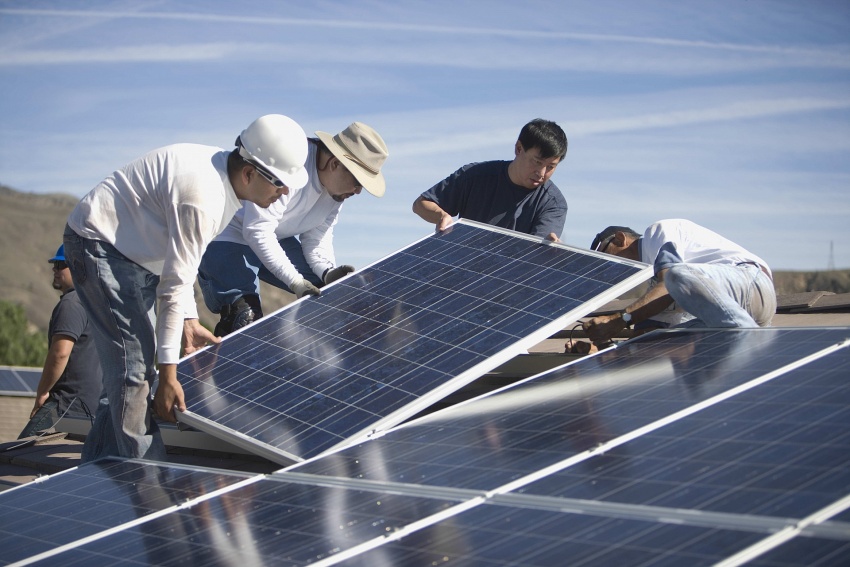Roundtable on transitioning to a just energy future
This is the first of a series of discussions, roundtables, and conferences that the United Nations Development Programme (UNDP) in Vietnam intends to hold, in cooperation with the Vietnamese government to clarify policy options available to the government as it seeks to promote financial system deepening and development.
The objective of this roundtable discussion is to raise awareness on the issue of development finance for a just energy transition. It will discuss the wider context of development financing, the role of domestic, and international finance, lessons learnt from international experience and domestic policy innovations that can support a just energy transition.
 |
| Vietnam is in critical need of transitioning to a just energy future |
At the roundtable, United Nations assistant secretary-general and UNDP regional director for Asia and the Pacific Kanni Wignaraja, who will be on a visit to Vietnam, will deliver a keynote speech on Financing Vietnam’s Transition to Renewable Energy: Beyond the Big Numbers.
Policymakers and experts will present policy recommendations that help attract the required finance for energy transition, lessons from Southeast Asia, and the role of green public development banks in accelerating climate action.
The subsequent panel discussion will focus on how policies could support private sector participation in the just energy transition.
At COP26 in November 2021 in Glasgow, the Vietnamese government pledged to achieve net-zero carbon emissions by 2050 with its own resources and international assistance, and halt investments in new coal power generation, scale up the deployment of clean power and phase out coal power in the 2040s.
One of the central challenges facing Vietnam is to meet climate change and energy transition commitments while ensuring that the country maintains its focus on achieving the Sustainable Development Goals, ending poverty, and promoting long-term economic transformation that leaves no one behind.
According to the UNDP, abundant, reliable, and affordable energy supplies are essential for economic development. Meeting the growing demand for energy is a huge challenge, as the country tries to meet the COP26 commitments.
As an emerging manufacturing hub and rapidly urbanising society, Vietnam’s demand for energy will grow rapidly over the coming three decades with transport, industry, agriculture, and construction transitioning from fossil fuels to electricity generated by solar, wind, and other renewable systems.
The UNDP said that increasing the supply of energy at affordable prices is a challenge of immense proportions. Achieving a just energy transition entails meeting this challenge while at the same time ending poverty and mitigating the impact of climate change on the most vulnerable members of society.
If renewable electricity generation is used to decarbonise the energy system as projected, the demand could increase five-fold by 2050.
According to the UNDP, finance is a key constraint to achieving a just energy transition. In this case, profitability and predictability are key factors.
Vietnam will work closely with development partners to access international financing, especially for imports of technology and equipment that cannot yet be produced locally.
However, given the required scale of investment and the government’s commitment to maintaining fiscal balance and macroeconomic stability, it is evident that most of the capital needed will be derived from domestic sources.
Nevertheless, Vietnam’s capital markets are still too small and the number of financial instruments available too limited to finance investment at the necessary scale. Financial development and innovation are therefore important components of a just energy transition.
| At the roundtable, key messages will be highlighted, including:
|
What the stars mean:
★ Poor ★ ★ Promising ★★★ Good ★★★★ Very good ★★★★★ Exceptional
Related Contents
Latest News
More News
- Foreign leaders extend congratulations to Party General Secretary To Lam (January 25, 2026 | 10:01)
- 14th National Party Congress wraps up with success (January 25, 2026 | 09:49)
- Congratulations from VFF Central Committee's int’l partners to 14th National Party Congress (January 25, 2026 | 09:46)
- 14th Party Central Committee unanimously elects To Lam as General Secretary (January 23, 2026 | 16:22)
- Worldwide congratulations underscore confidence in Vietnam’s 14th Party Congress (January 23, 2026 | 09:02)
- Political parties, organisations, int’l friends send congratulations to 14th National Party Congress (January 22, 2026 | 09:33)
- Press release on second working day of 14th National Party Congress (January 22, 2026 | 09:19)
- 14th National Party Congress: Japanese media highlight Vietnam’s growth targets (January 21, 2026 | 09:46)
- 14th National Party Congress: Driving force for Vietnam to continue renewal, innovation, breakthroughs (January 21, 2026 | 09:42)
- Vietnam remains spiritual support for progressive forces: Colombian party leader (January 21, 2026 | 08:00)

 Tag:
Tag:
























 Mobile Version
Mobile Version